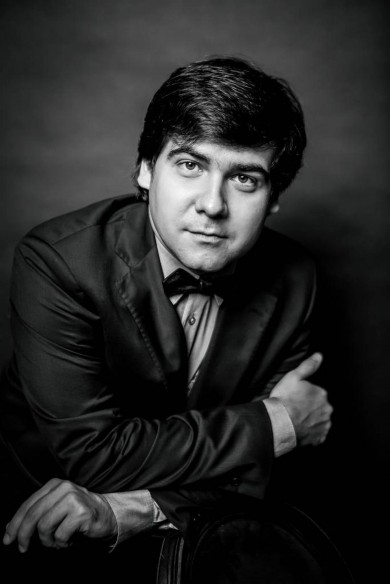Kholodenko recital provides mixed rewards at Kravis Center

Vadym Kholodenko performed a piano recital Monday afternoon at the Kravis Center in West Palm Bach. Photo: Ira Polyarnaya
When Vadym Kholodenko played a recital at Festival Miami three years ago, he left a decidedly mixed impression. The top prize winner of the 2013 Cliburn Competition exhibited impressive technique and blazed through colorful showpieces by Debussy and Balakirev. His performances of works from the classical and Baroque eras, however, were chilly.
On Monday afternoon Kholodenko returned for a matinee performance at the Kravis Center’s Regional Arts series in West Palm Beach. In performances of scores by Mozart, Beethoven and Tchaikovsky, Kholodenko remained, in the words of the protagonist of Rodgers and Hammerstein’s The King and I, “a puzzlement.”
The opening movement of Mozart’s Sonata No. 8 was replete with sudden tempo accelerations and pauses in the middle of phrases. These eccentricities were compounded by a hard touch that seemed closer to Beethoven than Mozart and a very obvious digital slip at the very beginning of the work. Kholodenko seemed like a different pianist in the two succeeding movements. Exquisite phrasing and pearly tone abounded in a beautiful Andante cantabile and the final Presto was fast indeed but shaped with lithe musicality.
Kholodenko brought an appealing middle ground approach to Beethoven’s early Sonata No. 2 in A Major. He captured the music’s lightness while projecting suggestions of the romanticism of Beethoven sonatas to come. In the opening Allegro vivace, runs were expertly calibrated and gradations of volume finely attuned. The slow movement presages the second movement Beethoven’s Appassionata Sonata with its repeated bass line. Kholodenko’s varied tempo and tonal coloration avoided monotony during the repetitions. Unfortunately the movement’s soft ending was compromised by a ringing cell phone.
The darting theme of the Scherzo was assayed with playful zest and there was steely thrust in the eruptions of the trio section. Kholodenko made another slip in the opening phrase of the Rondo finale and the entire movement was overly metronomic. His martial-like tempo seemed off the musical track.
Much beloved by Russian pianists (including such greats as Richter and Gilels) Tchaikovsky’s “Grand” Sonata in G Major seldom appears on North American concert programs. Tchaikovsky usually could write at least one memorable melody, even in his lesser scores (Hamlet, The Storm). This sonata finds the composer on one of his off days which is all the more surprising since it is contemporaneous with the Violin Concerto and Fourth Symphony. Aside from a pretty bell-like melody in the final movement, the sonata suffers from a huge overdose of bombast and pomposity. The challenge for any artist in a work of this nature is to make the music sound better than it is. Kholodenko did something more like the opposite.
The grand gestures of the opening were taken at a funereal clip and there were several more wrong notes in the lackluster development. At times Kholodenko resorted to unsubtle pounding with his tone turning increasingly harsh.
Despite a lighter and more sensitive touch, the Russian chorale theme of the Andante was reduced to bathos at Kholodenko’s leaden pace. The Scherzo, the work’s most appealing movement, needed a lighter, more playful style.
Kholodenko’s hard-hitting approach finally came into its own with a fiery reading of the closing Allegro vivace. He drew a nice contrast in the secondary theme, bringing out the sadness beneath the notes. There was a sense of musical line, shape and pulse that was missing from the earlier movements.
For his encore, Kholodenko offered an agile and finely shaded account of Rachmaninoff’s Prelude in G Major, Op. 32, No. 5.
The Regional Arts Series at the Kravis Center in West Palm Beach continues 8 p.m. Tuesday, December 5 with the Orpheus Chamber Orchestra playing Handel’s Water Music Suite No. 2, Shuying Li’s Out Came the Sun, Stravinsky’s Pulcinella Suite and Shostakovich’s Cello Concerto No. 1 with soloist Truls Mork. kravis.org
Posted in Performances
Leave a Comment
Tue Dec 5, 2017
at 12:26 pm
No Comments